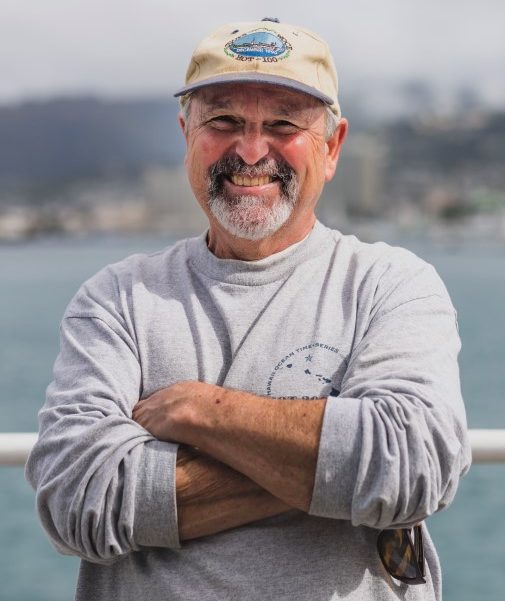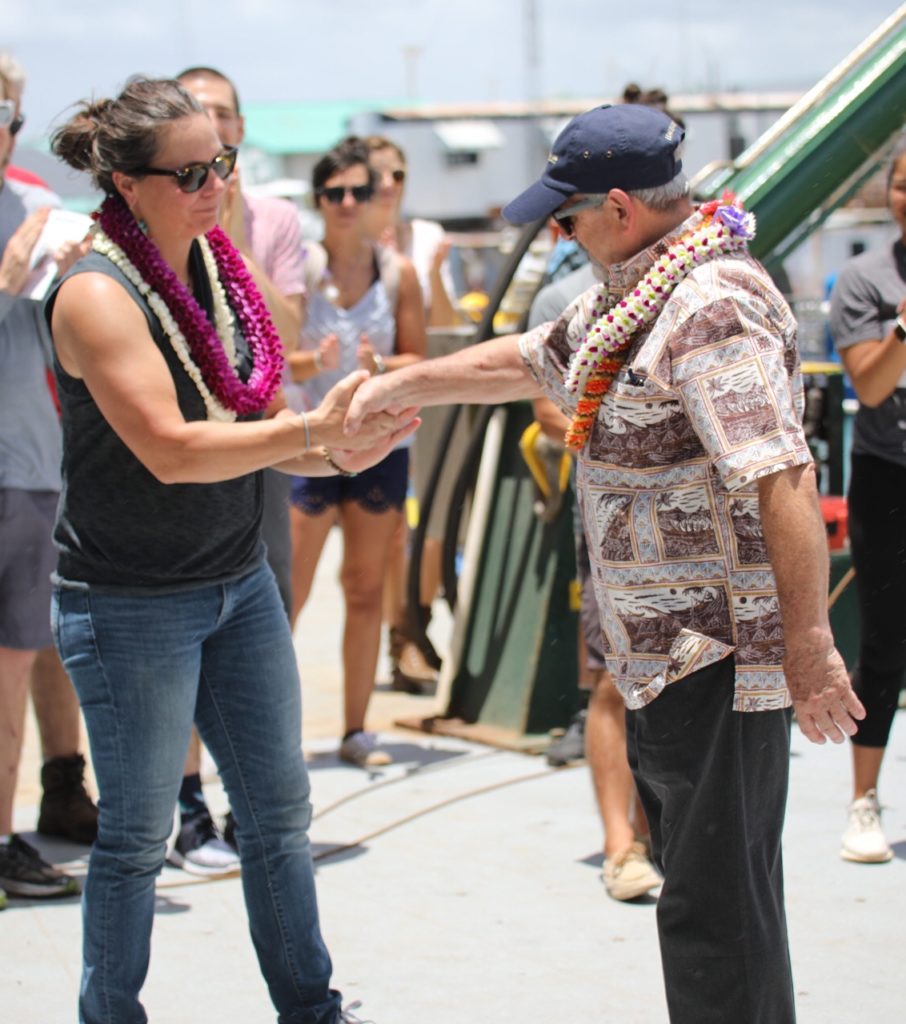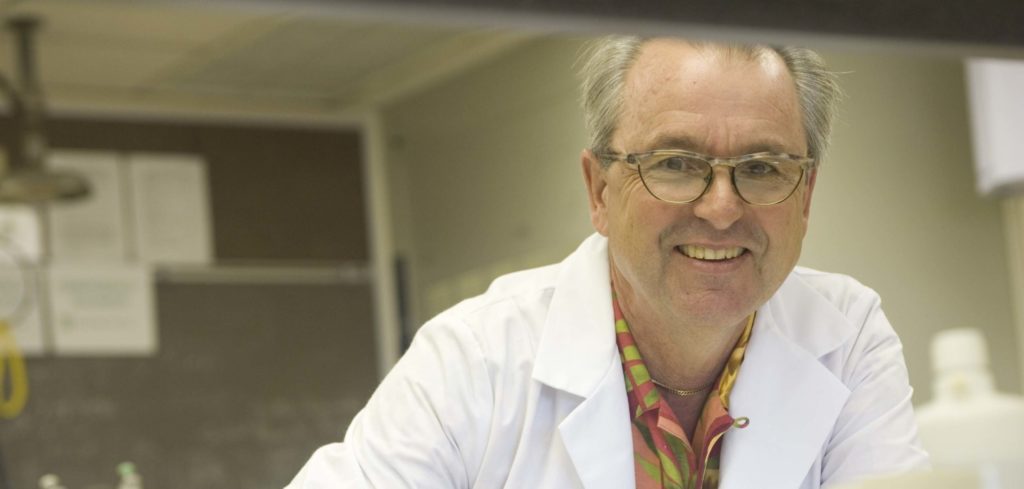The Man Behind the Science
David Michael Karl, world-renowned oceanography professor at the University of Hawai‘i at Mānoa (UH Mānoa), has contributed to some of the world’s most pivotal oceanographic discoveries, including the hydrothermal vents in the Galapagos Rift, a thriving food web in the frigid waters of Antarctica, and the development of widely adopted analytical methods to better understand ocean life and biochemistry. Most notably, he is known for helping to establish an open ocean time-series station, known as Station ALOHA, that has produced essential ocean scientific data over the past 30 years. At Station ALOHA, Karl and colleagues have provided the most convincing evidence of decreasing ocean pH (so-called “ocean acidification”), that is the result of increasing CO2 in the atmosphere (from fossil fuel burning), and its uptake into ocean waters over time.
On the other side of the ledger, Karl has been prolific in securing extramural research funding. Since joining UH Mānoa in 1978, Karl has been principal investigator on more than 80 grants bringing over $100 million in federal and foundation funds plus over $50 million additionally to support research vessels and submersibles used in his own research. In 2006, the National Science Foundation (NSF) awarded Karl and colleagues a 10-year $36.8 million grant that led to the establishment of the Daniel K. Inouye Center for Microbial Oceanography: Research and Education (C-MORE), one of only 17 NSF science and technology centers in the nation at that time. In 2014, a $48 million private foundation award created the Simons Collaboration on Ocean Processes and Ecology (SCOPE) to complement the research of HOT and C-MORE. To date, this award from the Simons Foundation, remains the largest one-time award to the University of Hawai‘i.
Befitting a distinguished career such as Karl’s, he was elected into the National Academy of Sciences in 2006, is a recipient of the Gordon and Betty Moore Foundation Investigator Award in Marine Microbiology, May 2004-2020; recipient of the 2013 Alexander Agassiz Medal from the National Academy of Sciences; and recipient of the 2015 Balzan Prize for Oceanography, to name just a few of many.
Born Leader

While all of these achievements, awards and accolades are impressive in the world of science, Karl the man shines even brighter due to his humility, generosity and kindness — traits that are not often found in scientists of his stature. C-MORE and SCOPE Co-Director Edward DeLong, a pioneering microbiologist in his own right, has known Karl for over 30 years and feels those particular traits and his ability to work collegially with diverse groups of people have made him a phenomenal science leader.
“Dave’s been able to assemble these groups of stellar people from renowned institutions like MIT, Woods Hole Oceanographic Institution, the University of California, and the Monterey Bay Aquarium Institute, to name a few. He is able to engage top scientists from around the world, and focus their energies on singular goals that none could achieve independently. The end result produces teams of scientists that can work together extremely effectively under Dave’s leadership,” said DeLong. “People trust Dave as a leader, because they trust him as person and as a world-class scientist.”
Karl is also known to lead by example, earning the respect of everybody from the boots on the ground and up. From going out to sea and working on deck to driving a forklift on the docks, no task is too small for Karl. “He likes to work on a level playing field. There is no hierarchy. Everybody’s on the same plane,” added DeLong.
Unmatched Generosity

Oceanography Associate Professor Angelicque White, who has recently taken over the reins of the HOT program, counts herself fortunate to have Karl as a mentor and colleague to call upon. She notes that a sense of generosity and community is what makes Karl unique.
“Without a doubt, he’s just there for a lot of people,” said White. “He’s the kind of guy you can send a paper to, ask for input and he will read it—making handwritten comments on anything from Oxford commas to ‘did you see this paper in 1972 on page three, column two that had a similar sentence that might help you think about the topic in a different way.’”
Another aspect of Karl that does not go unnoticed is his incredible generosity in his recognition of others and that he is always the first in line to celebrate with his team. “Who else takes their time to take their team soapbox racing or charters a pirate ship to celebrate the accomplishment and service of their employees?,” said HOT Field and Lab Manager Eric Grabowski, who has worked closely with Karl for over 20 years and has also developed personally and professionally under him. “While managing people, Dave seems to be keenly aware of the importance of dealing with the human side of life and not just the scientific.”
Although much of his team’s success falls on his shoulders, Karl is always quick to note that the accomplishment of the team could not happen without each individual. “Science is a team sport I always like to remind everybody of that,” said Karl. “I have the best team in the world. Things that get done are because of the people. As we say in Hawai‘i, it’s an ‘ohana (family). Every lab group is an ‘ohana and collectively we’re a larger ‘ohana.”
70th Birthday Celebration
To celebrate David Karl’s 70th birthday, colleagues and friends planned on hosting an international science symposium in Honolulu in May 2020. The multi-day event would bring together former and current colleagues, researchers and students—all of whose lives and careers have been enriched in a multitude of ways because of their association and friendship with Karl. However, due to the COVID-19 outbreak, event organizers decided to pivot from the symposium to a virtual birthday celebration. Over 100 colleagues, friends and family joined on May 8, 2020 for two and a half hours of recollections and tributes to Karl—including his sister Beverly Keil, a retired vice president with the Washington Post Company; his brother Tom Karl, a retired cardiac surgeon; and his cousin Debbie Robertson, a professor of marine biology at Clark University.
“Dave has sustained a major scientific program that helped UH Mānoa rise and put it on the map on all matters relating to the ocean. What is really special, is that he is truly a homegrown treasure for UH.”
–David Lassner, UH President
“Whether you are a friend, college student or collaborator, you know you can reach out and trust his wisdom and words. I’ve been fortunate to be able to give back to a man who has given so much to UH by working closely with Dave to make C-MORE a reality. The building doesn’t make Dave Karl, Dave Karl makes the building.”
–Vassilis L. Syrmos, UH Vice President for Research and Innovation
“Senator Daniel Inouye was immensely proud of Dave and this place (C-MORE Hale) he opened. He was proud because it was not an earmark. Proud of what one of the sons of UH produced in-house and he didn’t have to provide his political muscle to make it happen.”
–Brian Taylor, SOEST Dean, UH Mānoa
“You can see in his eyes that he loves to talk science. I used to enjoy talking to him as student and now my students talk to him. We all benefit from whatever interaction we can have with Dave, if we can just get a little piece of that knowledge that he carries inside of him, we’re all much better for it.”
–Chris Sabine, Interim Associate Dean for Research, SOEST, UH Mānoa

